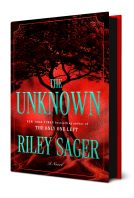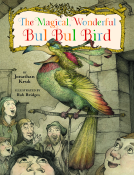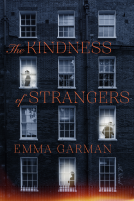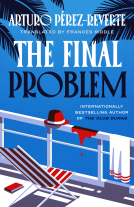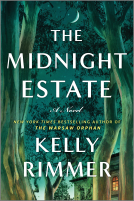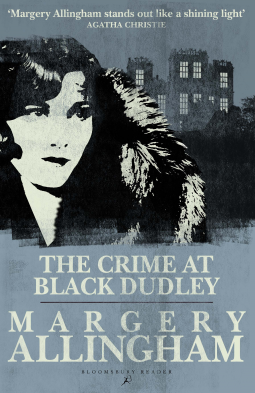
The Crime at Black Dudley
by Margery Louise Allingham
This title was previously available on NetGalley and is now archived.
Send NetGalley books directly to your Kindle or Kindle app
1
To read on a Kindle or Kindle app, please add kindle@netgalley.com as an approved email address to receive files in your Amazon account. Click here for step-by-step instructions.
2
Also find your Kindle email address within your Amazon account, and enter it here.
Pub Date May 06 2015 | Archive Date Mar 05 2016
Bloomsbury USA | Bloomsbury Reader
Description
The Crime at Black Dudley, first published in 1929, is the first novel which introduces Margery Allingham’s amiable sleuth—Albert Campion.
The Black Dudley is an ancient, remote mansion inhabited by recluse, Colonel Combe, but owned by Wyatt Petrie, a young academic who decides to revive his property with a weekend party to which he invites his friends and colleagues. Among the guests is George Abbershaw, a renowned doctor and pathologist who is occasionally summoned by Scotland Yard to help with consulting mysterious deaths. Abbershaw hopes that the leisurely weekend at Black Dudley will help him to get acquainted with red-haired Meggie Oliphant whom he quietly admires. Little does he suspect that instead he will be involved in a series of extraordinary and dangerous incidents which unravel one by one in the gloomy mansion and split the party.It all begins with a seemingly innocent ritual-game, played in Black Dudley for generations, in which a jeweled dagger is passed between the guests in the darkness. The young visitors are intrigued and eager to play, but when the lights are restored it becomes apparent that Colonel Combe has fallen ill. In the commotion of helping the invalid gentleman to his bedroom the dagger disappears and the Colonel is soon pronounced dead. Although Colonel’s closest friends claim that he suffered from a weak heart for many years, Abbershaw begins to suspect that there is more to his death. Soon the guests realize that the petrol has been drained from every single car and the party is imprisoned within the manor of Black Dudley with a murderer among them.
Luckily for Abbershaw, among the guests is Albert Campion—a garrulous and affable party-crasher with a great knack for solving mysteries and interrogating suspects.
Margery Louise Allingham was born in Ealing, London in 1904 to a very literary family; her parents were both writers, and her aunt ran a magazine, so it was natural that Margery too would begin writing at an early age. The Allingham family retained a house on Mersea Island, a few miles from Layer Breton, and it was here that Margery found the material for her first novel, the adventure story Blackkerchief Dick (1923), which was published when she was just nineteen. She went on to pen multiple novels, some of which dealt with occult themes and some with mystery, as well as writing plays and stories—her first detective story, The White Cottage Mystery, was serialized in the Daily Express in 1927. Allingham died at the age of 62, and her final novel, A Cargo of Eagles, was finished by her husband at her request and published posthumously in 1968.
A Note From the Publisher
This edition is available for Readers in the USA only due to Territorial Rights held by Bloomsbury. .
Advance Praise
'Margery Allingham stands out like a shining light' Agatha Christie
'Margery Allingham is notable for the energy and inventiveness of her writing' P.D James
'To Albert Campion has fallen the honour of being the first detective to feature in a story which is also by any standard a distinguished novel' Observer
Marketing Plan
No Marketing Info Available
No Marketing Info Available
Available Editions
| EDITION | Ebook |
| ISBN | 9781448214211 |
| PRICE | $5.99 (USD) |
Links
Average rating from 38 members
Featured Reviews
The Crime at Black Dudley by Margery Allingham
I'm ashamed to say that I have never read Margery Allingham before being offered the chance by NetGalley. Like my father, I seem to have a preference for British mysteries; and like my father, as he aged, I prefer the older titles with less detailed violence, sex, and language.
OPENING LINE: "The view from the narrow window was dreary and inexpressively lonely." This sets the atmosphere perfectly for what is to follow.
A weekend party at a rural estate is ruined when the host's uncle is murdered during a party game. The uncle had criminal connections and something he had that they want is missing. Who took it? The bad guys refuse to let anyone leave until that item is returned.
There are a lot of interesting characters to suspect among the guests, servants, and gang members. The plot has been described as haphazard but there's no problem following the story. The location allows for secret panels and passageways, which are great fun. This is certainly a classic mystery.
Apparently Allingham expected Dr. George Abbershaw would be her sleuth in this first book in the series, but it was the unusual and mysterious young man called Albert Campion, who captured readers and led to his promotion as hero of the series.
According to Mike Ripley "11 of her classic novels [will be} reissued this year and a further nine in 2016."
Bottom Line: If you love Dorothy L. Sayers and Agatha Christie, you MUST READ Margery Allingham. These three are often referred to as the three queens of British Golden Age detective fiction.
Title: The Crime at Black Dudley Author: Margery Allingham Series: Albert Campion (Book #1)
Genre: Classic British Mystery Publisher: Bloomsbury Published: May 6, 2015 (Ebook)
ISBN-13: 9781448214211
Rating: 4 out of 5 stars
Source: NetGalley
Disclaimer: An advanced copy of The Crime at Black Dudley was provided to me by Bloomsbury/Net Galley for review purposes.
Margery Louise Allingham was an English writer of detective fiction, best remembered for her "golden age" stories featuring gentleman sleuth Albert Campion. (Wikipedia)
 Rosemary S, Librarian
Rosemary S, Librarian
Originally published in 1929, this is a delightful Agatha Christie type mystery. A group of people gather at an old country house, the lights go off, a dagger goes missing and the elderly man in residence dies, ostensibly of a heart attack. The surviving members of the house party find that the gasoline has been siphoned from their automobiles, leaving them all stranded in a remote location with a killer on the prowl
Poor Albert Campion gets no respect — nor does his author, Margery Allingham.
Ninety years after Hercule Poirot first exercised his little grey cells in The Mysterious Affair at Styles and Lord Peter Wimsey first pranced through in Whose Body?, these redoubtable detectives and their brilliant authors are still household names. But Albert Campion? Like Ngaio Marsh’s Roderick Alleyn, Gladys Mitchell’s Mrs. Bradley, or Patricia Wentworth’s Miss Silver — all of whom were quite popular in their day but have, sadly, fallen into obscurity — Campion has been cheated of the lasting fame that is his due.
But perhaps Bloomsbury Reader’s new edition of Campion’s first case, The Crime at Black Dudley, first published in 1929, can remedy the situation.
Like television’s Colombo or Lord Peter Wimsey, the fair-haired, bespectacled Albert Campion at first glance appears to be a bit of fool. Do not be taken in! Wise-cracking and with a high-pitched voice, Campion is crazy like a fox; unlike the moralistic Lord Peter, he doesn’t mind playing both on the side of the law and on the other. Campion’s in attendance at a house party at Black Dudley when the host, Colonel Gordon Coombe, a wheelchair-bound man who wears a plate on his face to cover hideous scars from the war, dies. Although his personal physician claims the death due to heart trouble, two other guests, pathologist Dr. George Abbershaw and newly minted doctor, Michael Prenderby, soon work out that Coombe was murdered. They begin trying to ferret out what secrets lie at Black Dudley, but it is Campion, of course, who truly shines when the crooks emerge.
The Crime at Black Dudley contains a good deal more suspense and more twists that you’d ever expect in a British cozy released in 1929. Although more than 85 years old, the novel remains as much of a five-star read as ever, and I read it in just a few sittings. Priced at a mere $1.99 in the Kindle format, readers owe it to themselves to get a taste of Allingham’s delightfully quirky series with The Crime at Black Dudley.
In the spirit of full disclosure, I received this ebook from NetGalley and Bloomsbury Reader in return for an honest review.
 Judith L, Reviewer
Judith L, Reviewer
As much as I admire Margery Allingham's work, I must say I was surprised to find I had never read this book which is the first to feature Albert Campion. It was almost as if I could sense Allingham working out the boundaries she wanted to set for Albert. I'm very glad that she expanded those boundaries considerably in later books because this character stays a little too much in the background throughout this entire piece.
The classic setting of a weekend at a remote country estate is the centerpiece for the vast majority of the action here with the necessary collection of brilliant young people who simply show up on the doorstep and expect to be accommodated and entertained. It turns out that nobody really knows anybody else all that well so when a murder is discovered each character stands a pretty good chance of being `it'. All really good country house mysteries must feature a great location and Black Dudley satisfies that requirement completely. Not only does everybody have to figure out who they can really trust, but they also have to decide if these criminal types, who seem to have taken over the house, are actually who and what they say they are.
Once again a rousing good time provided by Mrs. Allingham. Once again I choose to overlook the plot holes which I don't allow modern authors. I have very high double standards.
I received an e-ARC of this novel through NetGalley.
 Jann B, Reviewer
Jann B, Reviewer
I received this from Net Galley in exchange for an honest review. I have not read any of the Campion books before and was interested to find (from Wikipedia) that Allingham originally intended Dr. George Abbershaw, a pathologist who was occasionally called in by Scotland Yard as a consultant, to be the hero of this book and any future mysteries. However, Campion’s character seemed to be more memorable, and the publishers encouraged her to use him as her focus.
The story was layered. A house party meets in the remote manor house of Black Dudley, owned by young Wyatt Petrie. His uncle by marriage, Colonel Coombe, was a sickly recluse who encouraged Wyatt to have young friends down to liven up the atmosphere. At this particular party, the guests were varied, and some were downright shady.
Of course, there was a story about the family dagger, including a ritual involving the dagger being passed around from hand to hand in the dark. The guests thought this would be great fun, so they dispersed into darkened corridors, the servants were dismissed, and the ritual began.
As expected, nothing good comes from this, and the Colonel has taken to his bed. He is later pronounced dead from a heart attack. Dr. Whitby is uncomfortable signing the death certificate to allow for a rapid cremation. Dr. Abbershaw does sign, but is able to get a glance at the body and realizes that the Colonel has been murdered.
The imposing, stone-faced guest named Benjamin Dawlish, takes the other guests captive, aided by Gideon, who is also an associate of the deceased Colonel. It seems Dawlish had come with the express intention of picking up something valuable, and he was not allowing anyone to leave until he retrieved the missing item.
The story unfolds as the cast of characters try to figure out who Dawlish is, what he wants, and who murdered the Colonel.
I believe the original publication date was 1929, but it was a refreshing read and had an appropriate number of twists, turns, and quirky characters. I will read more in this series!
 Katherine P, Reviewer
Katherine P, Reviewer
Going in to this one I wasn't quite sure what to expect. While I love classic mysteries they can tend to be a little dry and can be very dated. So I was a little surprised to find that the book pulled me in quickly and the story was fairly fast paced.
The mystery itself was interesting and I did really wonder who the murderer was and why. I found Albert Campion intriguing and an interesting character. In this book he seems more like Agatha Christie's Harley Quinn than an active detective. He does more background work and facilitates Abbershaw's investigation. I don't know if that is standard or if this is just something done at the beginning. There are some hints and clues that Campion isn't quite the silly fool that he seems. He reminded me of Sayer's Peter Wimsey with his almost talking in riddles and frequently acting the fool wen there is considerably more going on but Campion seems less academic and with a more flexible moral compass. I'm definitely curious to see if and how his character develops.
My only problem with this book is that the characters -other than Campion, Abbershaw and Meggie - were very flat. This isn't all that unusual in this kind of mystery but they were so flat that I had a hard time remembering who was who which made the conclusion a little less satisfying.
A delightful read in the genre of locked room mysteries! I received this novel as an ARC from NetGalley and enjoyed the quick light read. I love British style locked room mysteries and this fit the bill. The novel is full of secret passage ways, mysterious rituals, polite society and a dangerous gang. I believe this book is a reprint from an older novel and I am interested to see how it does. I know I love this style of novel and I hope that other people do too.
I was reminded of several different literary characters including Nancy Drew, Hercule Poirot (although he doesn't usually find himself in the danger that the crew at the Black Dudley landed themselves in) and Jeeves from PG Wodehouse's novels.
The book has an interesting end and I am curious to see if future novels bring together the same cast of characters. The novel has a lot going for it including humour, mystery, and romance.
I would recommend this novel to fans of Agatha Christie, locked room mysteries, murder mystery dinner parties and fans of Nancy Drew and the Hardy Boys.
 Paromjit H, Reviewer
Paromjit H, Reviewer
Albert Campion gatecrashes a party at Black Dudley Manor in which Colonel Coombe dies in suspicious circumstances. It turns out the Colonel was supposed to give a package to Benjamin Dawlish and it is now lost. Dawlish and his criminal gang now hold the guests captive. It becomes clear that the Colonel has been murdered to Abbershaw and the medic. However, it the quirky and mercurial Albert Campion who is instrumental in getting to the bottom of the case. Even though this is a relatively old mystery story, it is full of twists and suspense. I am glad that this novel was available currently as a Bloomsbury Reader via netgalley as it is a great example of the golden age of detective fiction. Many thanks to Bloomsbury for a copy of the book via netgalley.
 Leyla J, Reviewer
Leyla J, Reviewer
I love Margert Allingham books, and I haven't read any for a time, this one just bought back to me how wonderful these writer were. This story has all the elements, mystery, abduction, thrill, murder and just unbelievable fun. I just could not put this book down and missed it very much when I finished. Trying to find some more.
 Roisin S, Reviewer
Roisin S, Reviewer
To my mind this could not really be called a Campion novel as he plays a small part and is not involved at the end for the unveiling of the killer. I found the dialogue was really good and the suspense kept up until just before the end. In the end there were two separate storylines to wrap up. The first which involved Dr Whitby and friends came to a reasonable conclusion but the second which involved the unmasking of the killer I found very difficult to grasp. I had guessed the killer but it was the reasoning which I found hard to fathom. My suggestion would be to enjoy the book for the sharp dialogue, the introduction of Campion and then just suspend belief at the end. Subsequent Campion books were much better but I still give it 4 stars and recommend it to see how the author and her character subsequently develop and flourish.
 Barron B, Reviewer
Barron B, Reviewer
This is the first Allingham novel featuring Albert Campion. In fact, Campion is a supporting character in this mystery involving a party at a country house, a mysterious medieval ritual, organized crime and, of course, murder. While the writing is not quite up to the standards of Allingham's later work, this is a thoroughly engaging and satisfying mystery.
 Robin M, Reviewer
Robin M, Reviewer
For those who love the golden age of detective stories, The Crime at Black Dudley provides a wonderful opportunity to meet Albert Campion, that well loved, somewhat eccentric and unassuming character, whose development is worth following over a forty year career. I was surprised he began his career with a vacuous persona, given the intelligence with which he shines years later.
As with so many books of this era, it is sometimes necessary to bear in mind the times during which the book was written. This includes making allowances for the cultural norms and biases of the times. I rate it 3.7.
Readers who liked this book also liked:
Anthony Antoniou; ; Anthony Antoniou
Children's Fiction
Rasha Hamid
Children's Fiction, Health, Mind & Body, OwnVoices

